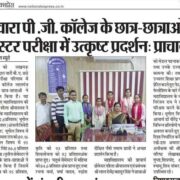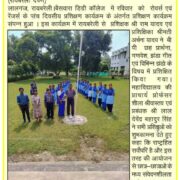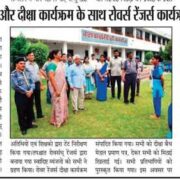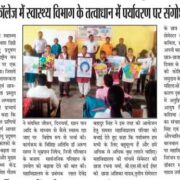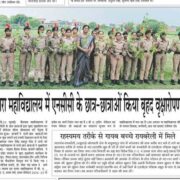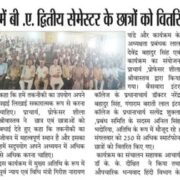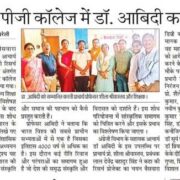Best Practices
Baiswara Degree College, Lalganj, is a government-aided institution that operates in alignment with the democratic ethos of participative management. The college prides itself on its ability to create an environment that fosters both academic empowerment and the holistic development of all its stakeholders. These foundational principles are not merely abstract ideas but are deeply embedded in the operational framework of the institution’s administrative and managerial processes. By adhering to these values, the college ensures that all voices are heard, creating a space where collaboration, shared responsibility, and inclusivity are prioritized. At its core, the institution embodies the principles of decentralization and participative management, practices that have become increasingly vital in educational and organizational settings. Decentralization, a key administrative practice at Baiswara Degree College, involves delegating decision-making authority to various levels within the organization. This approach empowers individuals at all levels, allowing them to contribute meaningfully to the day-to-day functioning of the institution. Over the last year, the college has witnessed significant improvements in its efficiency, responsiveness, and overall agility. Decentralization allows the institution to adapt more swiftly to the ever-evolving educational landscape, particularly in addressing challenges posed by technological advancements, shifting educational policies, and the unique needs of students and faculty alike.
The participative management style employed by the college emphasizes involving employees, faculty, and students in the decision-making processes. This inclusive approach is achieved through multiple channels, such as soliciting feedback, conducting surveys, holding regular team meetings, and actively encouraging suggestions and ideas from all stakeholders. By doing so, Baiswara Degree College ensures that the perspectives of those involved in the institution’s growth are taken into account. This method not only promotes transparency but also cultivates a sense of ownership among employees and students. Individuals feel that they are an integral part of the college’s journey, thereby fostering a deeper commitment to its goals and objectives. In today’s rapidly changing world, the importance of decentralization and participative management cannot be overstated. For educational institutions like Baiswara Degree College, these practices have proven to be indispensable in addressing both internal and external challenges. Decentralization enables a more dynamic response to the ever-changing educational environment, allowing for timely decision-making that is both informed and well-considered. Participative management, on the other hand, nurtures a culture of collaboration where everyone, from the teaching staff to the administrative personnel, feels valued and heard.
As an institution committed to continuous improvement, Baiswara Degree College understands that the collective intelligence and effort of its stakeholders are vital to its success. By engaging employees at all levels, the college fosters an environment of trust, accountability, and shared purpose. The participative approach is not limited to day-to-day operations; it extends to the broader vision of the institution, where all voices contribute to shaping its future. Ultimately, the integration of decentralization and participative management at Baiswara Degree College exemplifies a forward-thinking, democratic approach to education, one that not only enhances the academic experience but also nurtures the overall development of its community.


